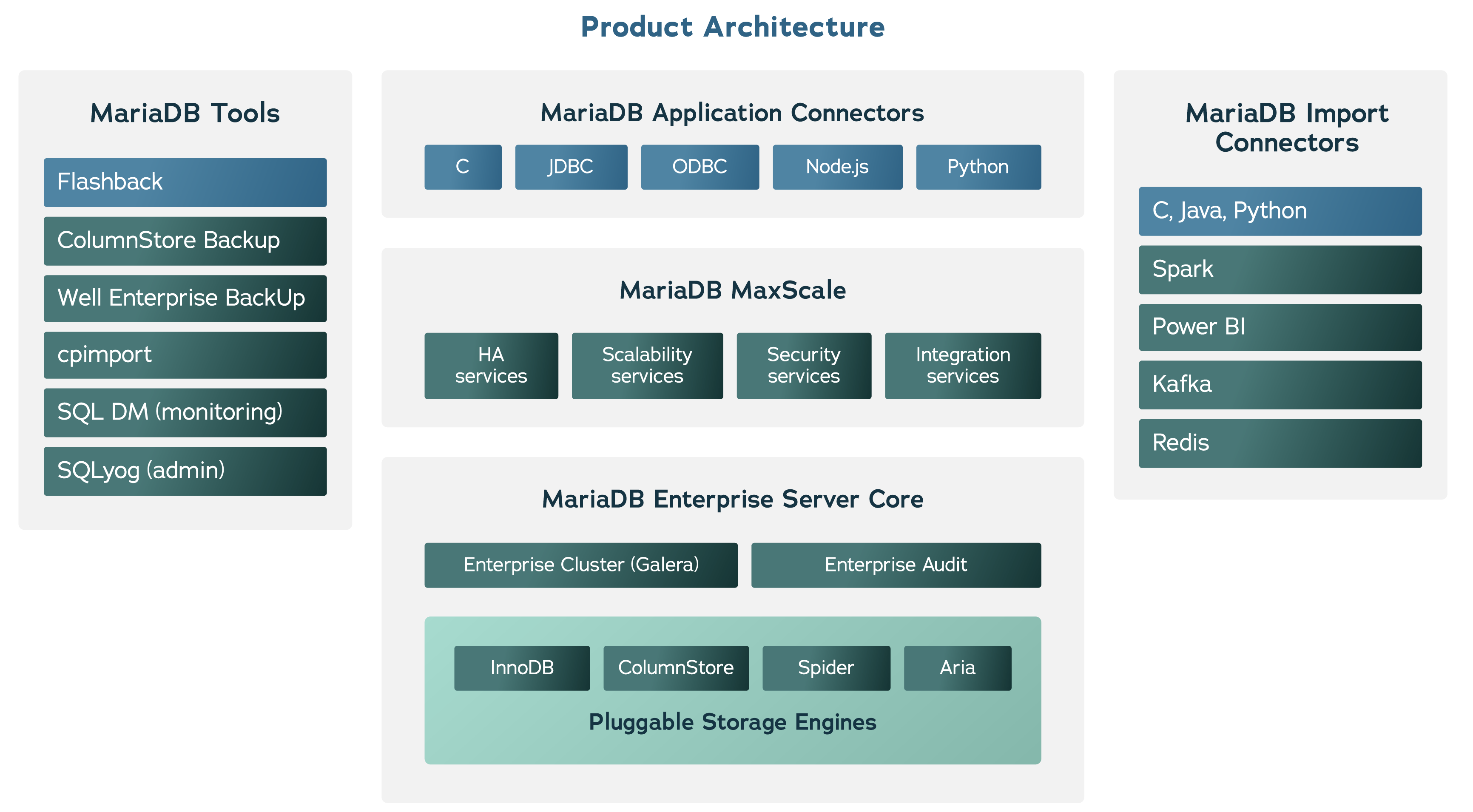MariaDB Enterprise Architecture
Automatic and Instant Failover
Enterprise Server with MaxScale is the only database with advanced features comparable to Oracle Application
Continuity. Together, they hide infrastructure and database failures from applications, resulting in zerointerruption
failover and online disaster recovery, and ensure the database is always available and its data
is always protected resulting in continuity for your applications. As part of performing automatic failover,
MaxScale migrates backend database connections to available server(s) – applications don’t have to create new
connections because of a failover. MaxScale also restores database sessions on a newly promoted primary after
it has performed an automatic failover – applications don’t have to restore sessions because of a failover. Finally,
MaxScale replays in-flight transactions after performing an automatic failover so they can continue – apps don’t
have to retry transactions because of a failover.
High Availability and Enterprise Cluster
MariaDB Enterprise Server leverages MariaDB MaxScale to transparently run in a primary/secondary node
(also known as a replica) configuration for high availability. With read/write splitting, replicas also support a
performance boost for read-intensive applications. MaxScale’s management of replicas prevents primaries
from being shut down until all replication has been completed to avoid a switchover or manual shutdown from
causing data loss. In addition to MaxScale, MariaDB Enterprise Cluster offers a multi-master (also known as
multi-writer) option based on Galera Cluster that provides synchronous multi-writer, multi-node replication with
built-in monitoring for cluster, node and session status. Enterprise Cluster encrypts transaction buffers and
performs non-blocking DDL replication for clusters greater than three nodes, preferably in an odd-numbered
configuration.
Open and Extensible Third-Party Integrations
MariaDB Enterprise Server provides enterprise federation by enabling high-performance access to tables in
remote databases using ODBC connections. In addition to ODBC, MariaDB Connectors are available for C, C++,
Java, JavaScript, and Python. Enterprise Server also includes MariaDB Client, which can be used to run queries
interactively or within scripts.
Enterprise Server integrates with Apache Kafka and Redis as the foundation of a modern data infrastructure for
enterprises, publishing changes to Kafka for stream data processing and integration and caching query results
in Redis. This not only improves query performance but reduces the load on the database, so fewer resources
are required or can be freed up for other queries. In addition to more efficiently utilizing database resources,
enterprises can get more from their existing Kafka and Redis deployments.
Enterprise Backup and Disaster Recovery
MariaDB Enterprise Server includes several tools and features for implementing comprehensive disaster
recovery plans, including non-blocking backups, and point-in-time recovery, and online point-in-time rollback.
In addition, delayed replicas (e.g., an hour, 12 hours and one day) can be used as part of an advanced strategy to
prevent accidental or malicious data loss/corruption from reaching backups. Backups for InnoDB include support
for full, partial, and incremental backups.
Enterprise Audit
MariaDB Enterprise Audit provides server-based auditing for MariaDB Enterprise connections, queries and
objects (databases, tables, etc.), logging activity in a granular and comprehensive fashion. Advanced filtering
features enable narrow definitions of which information is logged, giving DBAs broad yet granular control over
what gets audited. Auditing is configured with templates stored as JSON documents with options to filter
templates per user for databases and tables.
Enterprise Security
MariaDB Enterprise Server goes above and beyond standard security features such as roles and auditing, with
advanced data protection and security layers such as complete, end-to-end encryption. Enterprise Server
encrypts all data in motion with secure connections (TLS) and at rest, including logs, with transparent data
encryption (TDE). Enterprise Server uses Hashicorp Vault to delegate encrypted table key management, thereby
managing encryption keys outside the database.


